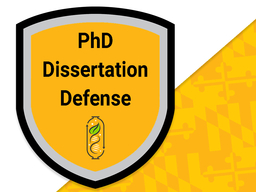PhD Dissertation Defense: Jahir Antonio Batista Andrade
Location
Public Policy : 206
PhD Dissertation Defense: Jahir Antonio Batista Andrade – Online Event
Date & Time
July 25, 2023, 9:00 am – 10:00 am
Description
Jahir Antonio Batista Andrade, PhD Candidate
Advisor:
Dr. Lee Blaney
Title:
Identifying wastewater inputs to urban streams by monitoring fluorescent dissolved organic matter and contaminants of emerging concern
Abstract:
Failing sewer infrastructure introduces raw wastewater into streams, threatening public and ecological health. This dissertation presents new environmental forensics strategies to identify, locate, and quantify wastewater inputs to urban watersheds. First, analysis of fluorescent dissolved organic matter (FDOM) via excitation-emission matrix (EEM) spectroscopy and parallel factor analysis (PARAFAC) were proposed as tools to track hotspots of raw wastewater in low-order urban streams impacted by sanitary sewer leaks and overflows. Novel EEM-PARAFAC parameters, including the ratios of (i) microbial soluble product-like and humic acid-like fluorescence (R4/R5) and (ii) tryptophan-like and fulvic acid-like fluorescence (C4/C3), were developed and employed to monitor wastewater-like FDOM. The proposed EEM-PARAFAC metrics were externally validated by assessment of contaminants of emerging concern (CECs), including sucralose, antibiotics, and UV filters, and bacterial indicator organisms at select sampling sites. Second, a comprehensive study on the spatiotemporal distribution of EEM-PARAFAC components and CEC levels was conducted to assess compositional differences between sites in the main stem and tributaries of two urban watersheds. Principal component analysis (PCA) and cross-covariance analysis were applied to the EEM-PARAFAC and land cover datasets to determine relationships between FDOM sources, fate, and transport and impervious surfaces, sewer density, and septic system density. The outcomes of the PCA and cross-covariance studies suggested that geospatial data related to impervious surfaces and sewer density could be used to inform smart sampling strategies in areas most susceptible to failing sewer infrastructure. Finally, a multilinear model was developed and validated to predict wastewater content in urban streams using data extracted from fluorescence EEMs.
The model was used to estimate the wastewater contents of 162 samples collected from an urban watershed, and the estimated wastewater contents ranged from 1% to 35%. The highest wastewater content was associated with an urban site known to be impacted by sanitary sewer leaks and flagged by earlier EEM and CEC analysis. The overall outcomes of this research provide alternative, rapid, and cost-effective methods to assess wastewater content in urban watersheds that do not receive wastewater effluent but are continuously affected by sanitary sewer leaks and overflows. These chemical, geospatial, and mathematical tools can also be used to estimate the potential impacts of failing sewer infrastructure on water quality in other locations.
Agneda
LOCATION: Public Policy (PUP) 206 & WEBEX
8:45 am EST - Welcome
9:00 am EST - Presentation followed by questions from the audience.
After the questions from the public, the meeting will be closed for the committee discussion.
WEBEX information:
Join using the green "Join Online Event" button at the top (myUMBC)
or
Join using the "Online Event" link at the top (cbee.umbc.edu)
or
Join by Phone
1-844-621-3956 United States Toll Free
Meeting Number: 2622 441 9243
Tags:
